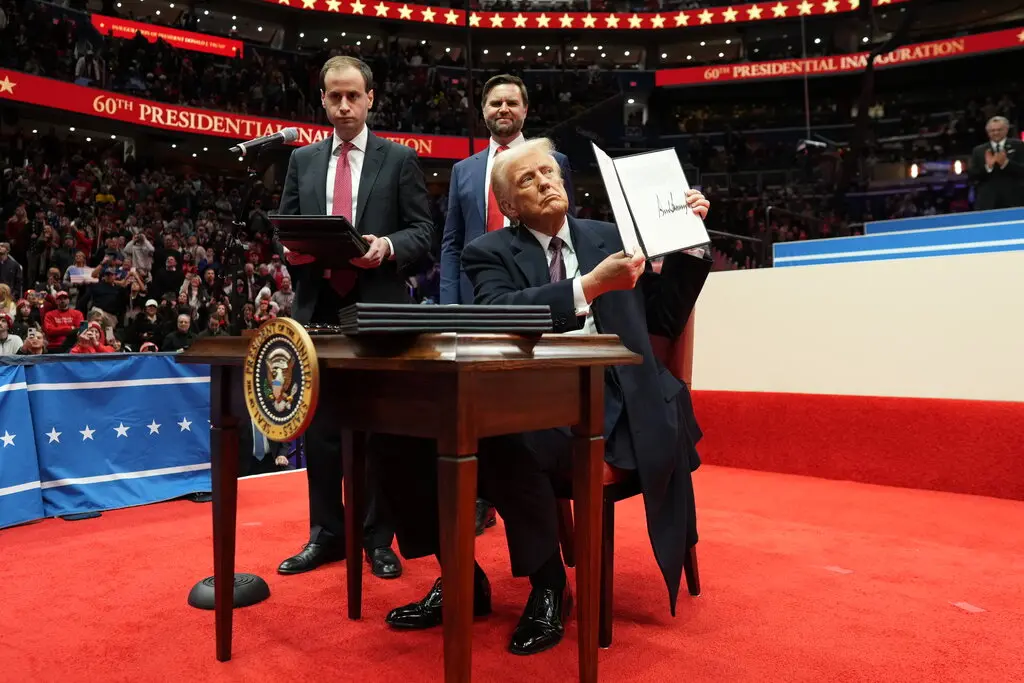18 States Sue to Stop Trump
Attorneys general from 18 states have launched a lawsuit against President Donald Trump in a bid to halt an executive order that seeks to deny citizenship to U.S.-born children of unauthorized immigrants. The lawsuit, filed on Tuesday in the Federal District Court in Massachusetts, represents the initial legal challenge in what is anticipated to be an extended battle over the Trump administration’s immigration policies.
Joining the states in this legal action are the cities of San Francisco and Washington, D.C., highlighting widespread opposition to the executive order from various levels of government. New Jersey Attorney General Matthew J. Platkin, leading the effort alongside his counterparts from California and Massachusetts, described the executive order as “extraordinary and extreme.” He argued that while presidents wield significant power, they do not possess the authority to unilaterally rewrite the Constitution. “Presidents are powerful, but he is not a king. He cannot rewrite the Constitution with a stroke of the pen,” Platkin emphasized.
The executive order, signed by President Trump on Monday as he commenced his second term, declares that children born to undocumented immigrants in the United States would no longer be granted citizenship. This policy extends even to the children of some mothers who are in the country legally but temporarily, such as those on student or tourist visas.
The Trump administration’s order is rooted in a contentious interpretation of the 14th Amendment, which has traditionally guaranteed citizenship to anyone born on U.S. soil, regardless of their parents’ legal status. The amendment’s phrase “subject to the jurisdiction” of the United States has long been understood to include nearly all children born in the country, with a narrow exception for children of foreign diplomats. However, Trump’s order argues that children of unauthorized immigrants do not fall under this jurisdiction, thus excluding them from birthright citizenship.
This stance starkly contradicts over a century of legal precedent. For more than 100 years, both the courts and the executive branch have consistently interpreted the 14th Amendment to affirm birthright citizenship. The executive order’s departure from this established interpretation has sparked intense legal and political debate.
Despite the legal precedents supporting birthright citizenship, there are indications that the judiciary might be divided on this issue. Judge James C. Ho, appointed by Trump to the U.S. Court of Appeals for the Fifth Circuit, has shown some sympathy for the administration’s arguments. Ho has controversially compared unauthorized immigrants to an invading army, an analogy also used by Texas state lawyers and Trump himself, who has described illegal border crossings as an “ongoing invasion.”
Nevertheless, the jurisdiction of the Fifth Circuit does not cover cases originating from Massachusetts, where the current lawsuit has been filed. Legal experts, including Gerard Magliocca, a professor at the Indiana University Robert H. McKinney School of Law, suggest that courts are unlikely to entertain the administration’s constitutional interpretations without legislative action from Congress. Magliocca pointed to recent Supreme Court rulings emphasizing that major political controversies require congressional intervention, not unilateral executive action.
“If that’s true of student loans or Covid-19 rules or whatever, you’d think it would be true of citizenship as well,” Magliocca remarked. He believes that the states opposing Trump’s order are on solid legal ground, and that the courts will likely side with them.
The legal challenge spearheaded by the attorneys general underscores a broader resistance to the Trump administration’s immigration policies. It also signals a potential check on presidential authority, reaffirming that significant policy shifts—especially those affecting constitutional rights—cannot be enacted without broader government consensus. As the case progresses, it will test the balance of power between the executive branch and the judiciary, as well as the enduring strength of the 14th Amendment’s guarantee of birthright citizenship.
This lawsuit represents a crucial moment in the ongoing discourse on immigration and constitutional rights in the United States, with implications that could resonate far beyond the current administration’s tenure.





